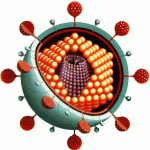Virology
|
30 july 2014 18:35:04 |
| AGG interruptions and maternal age affect FMR1 CGG repeat allele stability during transmission (Epidemiologic Perspectives & Innovations) |
|
Tweet Background:
The presence of AGG interruptions in the CGG repeat locus of the fragile X mental retardation 1 (FMR1) gene decreases the instability of the allele during transmission from parent to child, and decreases the risk of expansion of a premutation allele to a full mutation allele (the predominant cause of fragile X syndrome) during maternal transmission.
Methods:
To strengthen recent findings on the utility of AGG interruptions in predicting instability or expansion to a full mutation of FMR1 CGG repeat alleles, we assessed the outcomes of 108 intermediate (also named gray zone) and 710 premutation alleles that were transmitted from parent to child, and collected from four international clinical sites. We have used the results to revise our initial model that predicted the risk of a maternal premutation allele expanding to a full mutation during transmission and to test the effect of AGG interruptions on the magnitude of expanded allele instability of intermediate or premutation alleles that did not expand to a full mutation.
Results:
Consistent with previous studies, the number of AGG triplets that interrupts the CGG repeat locus was found to influence the risk of allele instability, including expansion to a full mutation. The total length of the CGG repeat allele remains the best predictor of instability or expansion to a full mutation, but the number of AGG interruptions and, to a much lesser degree, maternal age are also factors when considering the risk of transmission of the premutation allele to a full mutation.
Conclusions:
Our findings demonstrate that a model with total CGG length, number of AGG interruptions, and maternal age is recommended for calculating the risk of expansion to a full mutation during maternal transmission. Taken together, the results of this study provide relevant information for the genetic counseling of female premutation carriers, and improve the current predictive models which calculate risk of expansion to a full mutation using only total CGG repeat length. |
| 124 viewsCategory: Pathology, Virology |
 The spread of zoonotic Thelazia callipaeda in the Balkan area (Epidemiologic Perspectives & Innovations) The spread of zoonotic Thelazia callipaeda in the Balkan area (Epidemiologic Perspectives & Innovations)Design of static synchronous series compensator based damping controller employing invasive weed optimization algorithm (Epidemiologic Perspectives & Innovations) 
|
| blog comments powered by Disqus |
MyJournals.org
The latest issues of all your favorite science journals on one page
The latest issues of all your favorite science journals on one page



